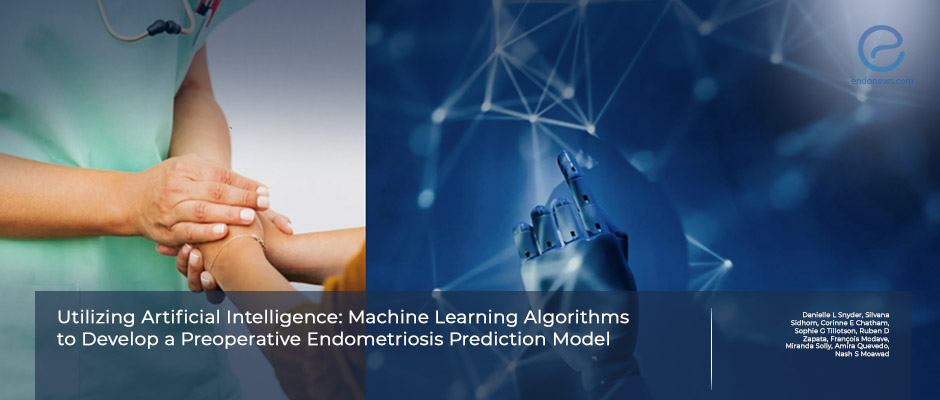Preoperative Endometriosis Prediction Using Machine Learning
Nov 5, 2025
Clinical findings analyzed by machine learning help predict endometriosis preoperatively.
Key Points
Highlights:
- Machine learning models can accurately predict endometriosis before surgery by analyzing patients’ clinical characteristics and symptom patterns.
Importance:
- Early, noninvasive prediction of endometriosis could shorten diagnostic delays, guide timely referral to specialized centers, and help identify patients most likely to benefit from minimally invasive surgery.
What’s done here:
- This is a retrospective case–control study including 788 women aged 18–55 years who underwent laparoscopic or robot-assisted excision surgery for suspected endometriosis.
- Overall, 496 patients had histologically confirmed endometriosis, and 292 women without the disease served as controls.
- Machine learning models—XGBoost, random forest, and logistic regression—were developed using clinical characteristics, menstrual history, and pelvic examination findings to predict the likelihood of endometriosis before surgery.
Key results:
- The model identified several independent clinical predictors of endometriosis, including:
- Emesis - crampy pelvic pain - regular menstrual cycles - higher severity of dysmenorrhea - retrocervical tenderness on rectovaginal examination
- Among the tested algorithms, XGBoost achieved the highest predictive performance, demonstrating the feasibility of AI-assisted preoperative risk assessment for endometriosis.
Strengths and Limitations:
- The large single-center design applying multiple machine learning algorithms, particularly XGBoost, to predict endometriosis using only clinical and examination data is the strength.
- The retrospective single-center nature without external validation or imaging variables, which limits the model’s generalizability and clinical applicability, is the limitation of the study.
From the Editor-in-Chief – EndoNews
"This study highlights a crucial truth often overlooked in the age of advanced imaging and molecular diagnostics: the patient’s history and physical examination remain the cornerstone of preoperative endometriosis diagnosis. By showing that machine learning can extract predictive value from basic clinical features—menstrual patterns, symptom profiles, and pelvic tenderness—this work validates the diagnostic power already embedded in routine clinical encounters.
The model’s impressive sensitivity demonstrates that technology can amplify, rather than replace, clinical judgment. It also reinforces that systematic documentation of clinical findings is not merely clerical—it is the very data foundation that enables intelligent prediction and individualized care.
Nevertheless, the retrospective and single-center design limits the model’s generalizability, underscoring the need for external validation across diverse populations.
Ultimately, this study reaffirms that careful listening to the patient and meticulous examination, when supported by machine learning, may open the path to earlier recognition of endometriosis and more timely intervention."
Lay Summary
Machine learning algorithms can predict endometriosis before surgery by analyzing patients’ clinical characteristics, according to a new study published in the Journal of Minimally Invasive Gynecology.
The researchers found that factors such as retrocervical tenderness, crampy pelvic pain, and regular menstrual cycles can assist clinicians in identifying women likely to have endometriosis. These findings could help primary care physicians recognize the disease earlier and refer patients for specialized evaluation and treatment. “Further validation in diverse populations is necessary to develop a widely applicable clinical prediction tool,” the authors noted.
To test whether clinical characteristics could predict endometriosis using artificial intelligence, a research team led by Dr. Nash S. Moawad from the Division of Minimally Invasive Gynecologic Surgery, University of Florida College of Medicine (Gainesville, FL) conducted a retrospective case–control study between 2011 and 2022.
The study included 788 women aged 18–55 years who underwent laparoscopic or robot-assisted excision surgery for suspected endometriosis. Among them, 496 (83%) had histologically confirmed disease. The researchers assessed 209 clinical parameters, including demographics, presenting symptoms, gynecologic and obstetric history, and physical examination findings, as potential predictors. The primary outcome measure was the performance of the model in predicting endometriosis.
The results showed that the majority (83%) of patients had endometriosis confirmed by pathology. The machine learning algorithm, extreme gradient boosting, achieved 83% accuracy and 96% sensitivity.
In addition, Shapley Additive Explanation analysis identified key predictors: emesis, crampy pain, regular periods, severity of period pain, and retrocervical tenderness on rectovaginal examination.
The findings suggest that applying machine learning to clinical data may help predict endometriosis preoperatively, reducing diagnostic delay and supporting earlier referral to specialized care.
Research Source: https://pubmed.ncbi.nlm.nih.gov/40398559/
machine learning endometriosis diagnosis symptoms laparoscopy

